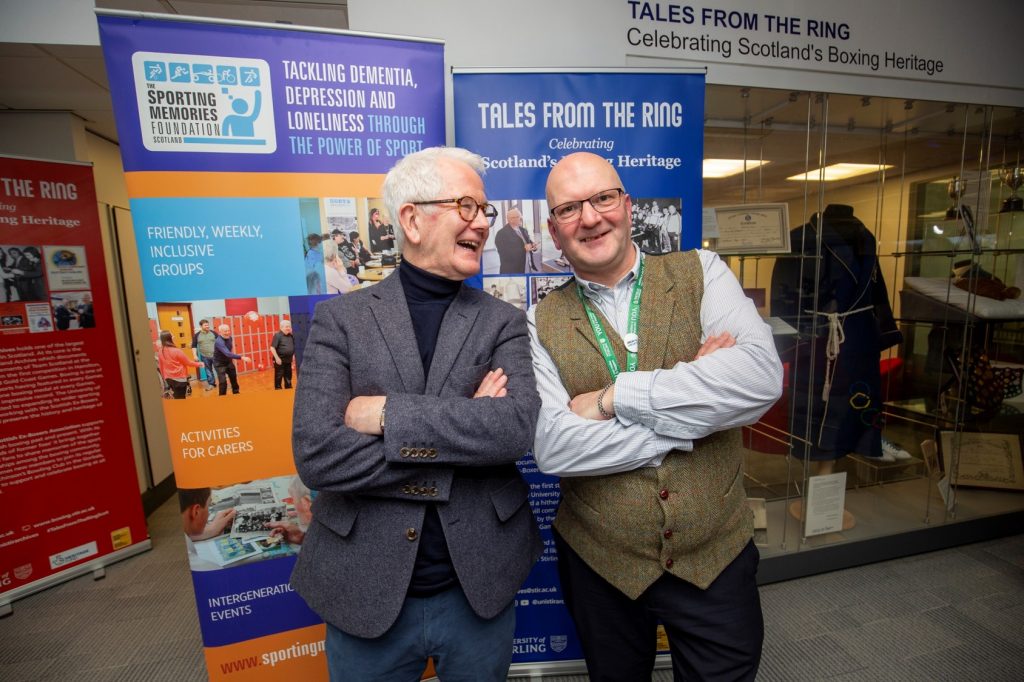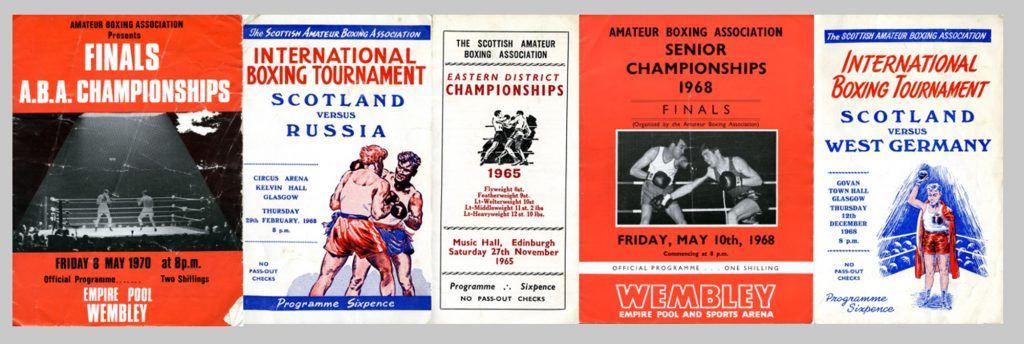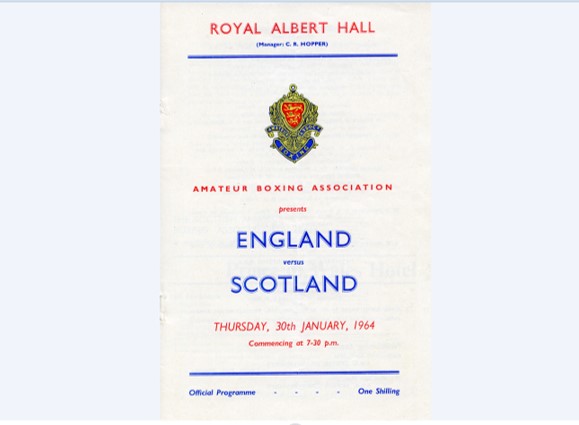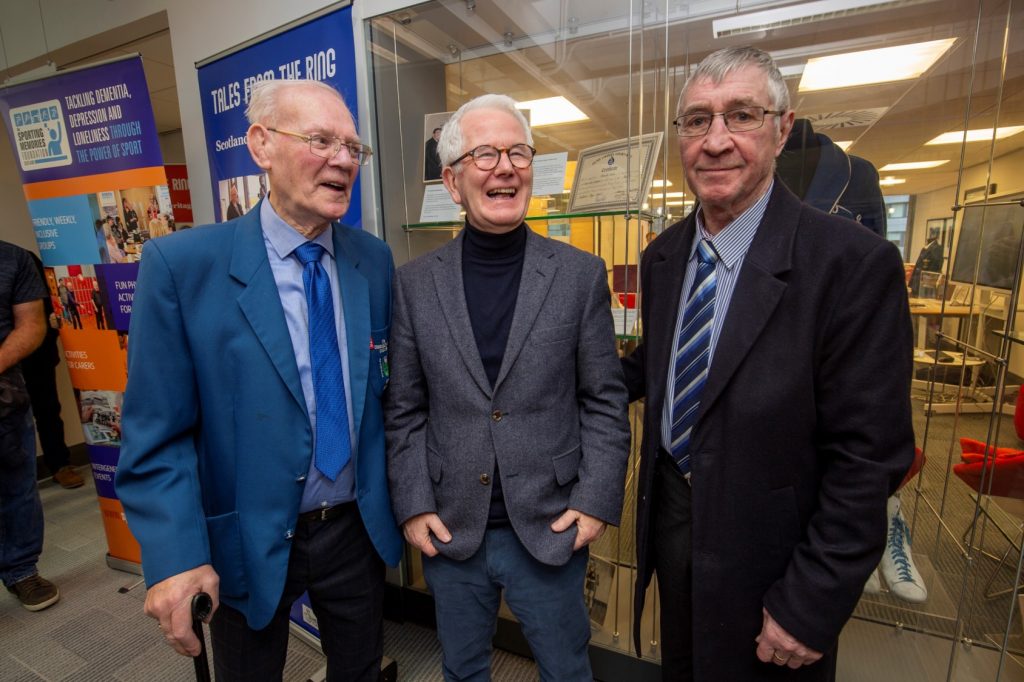The tales from the ring project provided a great opportunity to meet and interview a range of Scottish boxers past and present. This article provides extended extracts from my interview with Frank Gilfeather who followed a promising spell as a young boxer with a career as a sports journalist and broadcaster. Over an enjoyable afternoon in November 2019 Frank provided me with a memorable account of his sporting life, taking in early experiences in the ring, representing Scotland, and deciding to hang up his gloves at an early age.
Ian Mackintosh, Project Officer

Frank Gilfeather was born into boxing. His father ran a boxing club in Lochee, Dundee. Indeed, it could be argued that the gym was his babysitter. Boxing was a family affair. As well as running a boxing club his father was also involved with the Scottish Amateur Boxing Association. Frank’s two older brothers were also boxing champions. Daniel was British Youth Champion in 1949, while Dennis was a Scottish Champion and Scottish Internationalist and later became an international judge and referee.
Growing up in the ring Frank competed in many local and regional tournaments, competing against young boxers from Perth, Montrose, Brechin, Forfar and Arbroath. He reckons that he must have had about 200 fights in his career because when competing at competitions at both youth and senior levels you could be boxing up to three times in one night. They don’t do that now. That’s how you gained experience then. Frank’s boxing style was defined as a purist – demonstrating technique and skill rather than brawn. Aged 17 he moved up to senior level, competing in the Scottish championship in the featherweight division. He reached the final where he met Evan Armstrong, a former British champion:
I remember I had really tough contests. My first was against a guy called Bobby Russell who I stopped in the third round. The second one was against a guy called Jim Gibson from Fife. He was an unbelievably tough opponent. Jimmy was all elbows and forearms and thumps of the head, the whole bit, so in the semi-final he took a lot out of me. Evan Armstrong on the other hand, he was knocking his opponents out or stopping them, so he had an easier time [of it]. What it meant was that when we met in the final (which wasn’t too long after I’d boxed Gibson in the semi-final) he was fresher and of course won clearly. The one thing I do remember that night was that when I went to my hold-all to get my boxing kit out I’d left my gumshield back in the gym. So, I boxed three fights without a gumshield, and I had enormous lips at the end of it where I’d been thumped, so that was a big memory for me.
Frank Gilfeather, 2019
As a senior Frank won the Scottish lightweight title in 1965 at the Music Hall, Edinburgh:
You know something, I can’t even remember who it was I beat in the final. It’s funny how you remember different things. The thing I remember was that the following day was a Sunday. In those days national newspapers covered amateur boxing like it was only second to football and so it was plastered all over the Sunday papers that I’d won the Scottish Championship – and I remember walking from the house on the Sunday morning to the bus stop with my dad and wee sister – we were going to mass – and my dad just touched me on the arm and said ‘remember to keep your feet on the ground’. And I thought wow, he must have seen it in me, for this was a big deal for me, I was Scottish champion. These are the crazy things you remember rather than the actual event or who you fought
Frank Gilfeather, 2019
They always say you should never meet your hero because it can be a disappointing experience. For Frank this couldn’t be further from the truth.
I met my hero, Sugar Ray Robinson. [As a young boxer] I used to read the Boxing News every week and I realised that Robinson was the greatest pound for pound fighter who ever lived. Maybe that’s moved on, people will have their own opinions. Years later when I was Walter McGowan’s chief sparring partner, I was through in Hamilton training with him when his father Joe Gans (who was also his trainer) said to me, I want you back next weekend, and we’ll be training at another venue at St Cuthbert’s Church Hall, there will only be around four or five of you. I asked why and he replied you’ll see when you come through. When I went through the following week there was Sugar Ray Robinson training. He was in Glasgow to box Nick Leahy at the Paisley Ice Rink. Robinson was about 43 at the time and he was just trying to get money to pay his taxes. When he walked into the changing room my jaw just dropped, I though wow, this is like meeting Elvis Presley or the Beatles. It was just a remarkable experience. I’ll never forget it. It was great just to be punching the bag next to Sugar Ray. I couldn’t train properly because you couldn’t take your eyes off him, he was magic.
Frank Gilfeather, 2019

Frank boxed for Scotland on 16 occasions. Representing his country gave the young boxer the opportunity to travel around Europe. His first trip abroad was to Denmark where he recalled fighting in front of 4,000 spectators at the KH Hall in Copenhagen. He also travelled to Bulgaria where he fought a Major in the Bulgarian army in front of a huge crowd in the football stadium of the Locomotive Sofia team. In 1965 he competed at the European Championships which were held in East Berlin, a memorable trip behind the Iron Curtain:
I’m not convinced I’ve got the greatest memory of my career. I have greater memories of events outside the ring. I remember in East Germany going through Checkpoint Charlie. I hadn’t kept my papers which allowed me entry, thinking I wouldn’t need them. But I was challenged when coming out of East Berlin back to the west. Because I didn’t have my papers I was made to take a step back while everyone else went through. Then began a mild interrogation, the guards thinking perhaps I’d sold them to somebody in East Berlin. So, these kinds of things were the experiences I remember rather than those in the ring.
Frank Gilfeather, 2019
Frank’s biggest disappointment was losing out in the final of the ABA championship in 1965. Going in to the competition as Scottish champion Frank was confident, even more so as he had beaten the reigning ABA champion at a Scotland v England match in Glasgow earlier in the year.
My biggest disappointment was not being the ABA champion. The reason I say this is because boxers themselves know if they’ve done enough to win. I was beaten in the Bellevue arena in Manchester by a guy called Tommy Wright and I remember being told afterwards that live on TV Harry Carpenter the commentator had said “that’s another win for Scotland”. That was before the decision was announced. I lost 2-1 with the judges – that was disappointing. It was a big, big deal to be the ABA Champion, and I wanted it for my dad. He had been my mentor and had actually coached me without ever being in my corner. He talked about the technique of boxing and the ability to use your brain, rather than your brawn, and that was the key. I think that is missing from a lot of amateur boxing these days where it is principally slam, bang, wallop rather than skill and technique. In the Scotland team that year you had John McCluskey at flyweight, Bobby Mallon at bantamweight, Ken Buchanan at featherweight and me at lightweight. The other three guys were on before me and were winning all the time – and then you’re being told before you go into the ring ‘they’re not going to allow this to continue, for Scotland to keep winning’ and so on. So maybe I suffered a wee bit from that.
Frank Gilfeather, 2019
Frank retired from boxing just before he turned 22. He felt that he’d given everything to boxing and the endless round of training and competition was taking its toll. He was wearying of the routine.
I was getting fed up with it. I’d boxed at a very high level and trained with all the professionals. I was Walter McGowan’s leading sparring partner for a while because his dad said I was the only guy who could make him think. And I’d had a tremendous time, but I remember vividly boxing in the Scottish championships in the music hall in Edinburgh. I was boxing a guy called Ricky Dey who was from Edinburgh, and he was a decent boxer, and I remember after round one coming back to my corner and my trainer giving me a barracking because I wasn’t doing well enough, but I didn’t have anything to give and I didn’t care. I remember saying to them at that time this will be my finale. They said what are you talking about? And I said I can’t be bothered with this anymore. I knew there and then sitting on the stool that I’d no appetite for it and that was the finish.
Frank Gilfeather, 2019
After leaving the ring Frank pursed a career in journalism. He moved to Aberdeen where he worked on the Evening Express and Press and Journal. He also wrote a column in the Green Final which was the Saturday nights sports paper. He decided to cover amateur boxing in the north east as he felt it was being ignored by the press. He travelled around the amateur shows and ended up becoming an MC. He moved into television with Grampian and was their first sports correspondent on outside broadcasts. He also persuaded Grampian to cover amateur boxing internationals and used his contacts in boxing to bring in a range of expert pundits including Ken Buchanan.
Today Frank still works as a freelance journalist and continues to cover sport in his columns.
Programme for England v Scotland, 30 January 1964

My experiences of appearing at the Royal Albert Hall in London were just awe inspiring. 7,000 people were there and Harry Carpenter was commentating for live TV. They were big occasions. Boxing for Scotland versus England was special, for obvious reasons. It was the big thing. We boxed against other countries where we never stood a chance – like all of the Eastern European countries where there boxers were virtuallt full-time amateurs. They were in the army and subsidised by the state. But England were special, they were good. My first time in the Albert Hall was against Dougie Waite – should have won but I didn’t, split decision.
Frank Gilfeather, 2019
The following year Frank returned to the Albert Hall with the Scottish team and fought Johnn Eales, the leading English lightweight at the time.
I beat him [Eales] on points quite comfortably. These competitions were great experiences because you went away with guys who you respected like John McCluskey, a double ABA champion and later British flyweight champion. Ken Buchanan, well everyone knows about Kenny, he was special. We boxed at Leith Town Hall as featherweights and he beat me comfortably. Dick McTaggart, he was a fellow Dundonian, he boxed against my brothers as a youth. To be with him and to think of his phenomenal record, which will never be repeated because boxing has changed so much. These were all wonderful experiences.
Frank Gilfeather, 2019
